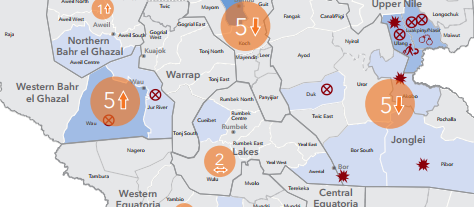Map: Interference with humanitarian work in South Sudan

A total of 35 access incidents were recorded in South Sudan in January, with nearly a quarter (23 per cent) involved violence against aid workers and assets, a UN agency said.
This represents a reduction in incidents as compared to the 2018 monthly average of 52 per cent.
A map published by the UN Office for the Coordination of Humanitarian Affairs (OCHA), available for download below, shows that the majority of access incidents occurred in Ulang, Yei, Wau, Juba, Rubkona, Fangak and Nasir areas.
“State civilian authorities and criminals or unknown perpetrators were responsible for half of all access incidents, “the UN agency said.
OCHA further said 11 incidents were significant in severity, including the detention and relocation of staff, commandeering of vehicles and convoy blockages.
It revealed that the security situation in Ulang, Upper Nile, resulted in the relocation of 38 humanitarian staff from the area and minor disruptions to programmes.
“Non-state authorities in Jikmir, Upper Nile, claimed there were new exit clearances required from the security officials. This resulted in one aid worker being arbitrarily detained by the non-state authorities and held in a pit in the ground in Mandeng,” OCHA said.
OCHA noted that state security forces detained two staff in Yei town and confiscated funds meant to pay incentives to volunteers working at Ebola screening points in Otogo County.
It added that this negatively impacted on humanitarian movement and Ebola preparedness in areas such as greater Morobo, Otogo and Mukaya counties.
“Humanitarians were not able to reach around 23,000 people around Yei. Humanitarian supplies were blocked at border entry points following the December 2018 republican order on import duties and unclear definition of humanitarian goods. While the backlogged goods started to flow by the end of the month, some items remained contested, such as vehicles,” OCHA said.
An increasing number of checkpoints and fees demanded were reported along the Juba-Bentiu corridor with an average of 700,000 South Sudanese pounds (around US$4,500) per truck being paid across an estimated 57 checkpoints, according to the UN agency.
It pointed out that operational interference and bureaucratic impediments continued to hinder humanitarian response in both state and non-state areas, such as Fangak, Juba, Nasir and Rubkona.
“In Yirol East in Lakes, inter-communal violence prevented health teams from conducting a reactive measles campaign,”OCHA said.